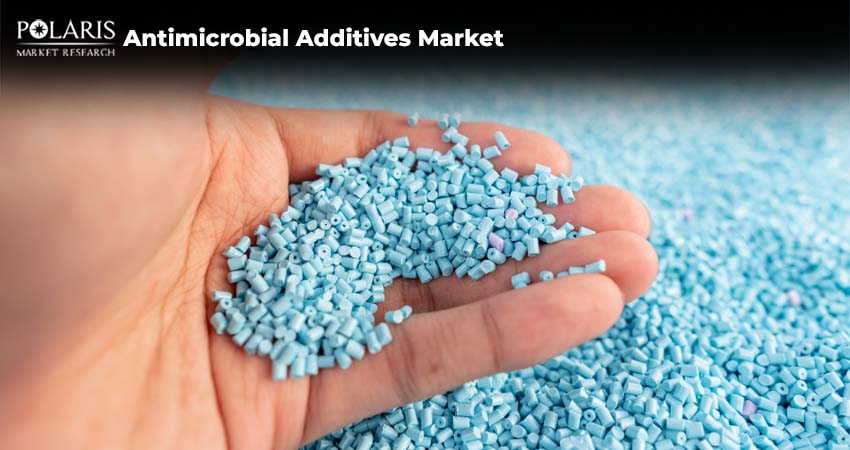Understanding Crucial Role of Antimicrobial Additives in Enhancing Hygiene

Microbes are ubiquitous. Microbes exist on the surfaces we touch, the clothes we wear, and the paint on the walls; many are beneficial and necessary for our working, but some could be dangerous. This is where antimicrobial additives can help, as they work passively at the microscopic level to prevent the growth and spread of microbes.
With the rise in awareness of infectious diseases and the risk of contamination, manufacturers are adding antimicrobial additives to their products. In this blog, we will examine how antimicrobial additives work and the necessity to use them. Then we'll cap it off with a highlight of the top offering companies antimicrobial additives. Keep reading!
Antimicrobial Additives: Overview
Antimicrobial additives are substances incorporated into various materials during the manufacturing process. These materials are added to provide long-lasting protection against harmful microbes. These additives are different for disinfectant sprays that work only temporarily on surfaces. As antimicrobial additives are integrated within the product itself, they offer continuous protection for the product’s entire life.
With rising industrialization and growing awareness about infection control, the antimicrobial additives market is witnessing sustained growth. According to our latest assessment, the market for antimicrobial additives is expected to grow at a CAGR of 8.5% over the forecast period. The market is projected to reach a value of USD 7.96 billion by 2034.
How Antimicrobial Additives Work?
Antimicrobial additives protect materials like plastics and textiles by stopping microbes from growing or killing them. They use several mechanisms to do this:
Disrupting Cell Walls: Antimicrobials, such as those containing copper or silver ions, damage the cell walls of bacteria or fungi. This stops them from functioning or multiplying.
Blocking Enzymes: Some antimicrobials can block enzymes essential for the energy production of the microbe or other vital functions.
Damaging Cell Membranes: Antimicrobials like quaternary ammonium compounds (QACs) can disrupt the cell membrane. This causes the content of the cell membrane to leak and kills the cell.
Interfering with DNA: Some antimicrobials can bind to the DNA of the microbe. The microbial DNA attachment prevents replication and causes cell death.
Increased Reactive Oxygen Species: Antimicrobials can increase the levels of reactive oxygen species within the microbe. The increase in reactive oxygen species damages the internal system of the microbes and stops them from multiplying.
Broad-Spectrum Protection: Many antimicrobial additives are designed to work against a wide range of microbes. These include bacteria, fungi, and even some viruses.
Which Are Key Market Companies?
Microban International
Founded: 1984
Headquarters: Huntersville, North Carolina, USA
Focus Areas: Plastics, Healthcare
Microban is a pioneer in antimicrobial solutions. It offers additives for consumer products, electronics, and healthcare items. Their technology is embedded in brands like Whirlpool and Samsung. Microban is also focused on developing sustainable solutions. The company’s Refresh technology combats odor without using metal-based chemistries.
BASF SE
Founded: 1865
Headquarters: Mannheim, Germany
Focus Areas: Industrial Coatings, Plastics,
BASF SE is a global leader in chemicals. It offers a range of additives in the antimicrobial additives market. Its antimicrobial additives are widely used in medical devices, plastics, and paints. These additives are designed to prevent bacterial growth on surfaces and in materials. Their use ensures longer product lifespans and improved hygiene.
DuPont
Founded: 1802
Headquarters: Wilmington, Delaware, USA
Focus Areas: Coatings, Textiles, Adhesives
DuPont is involved in antimicrobial is primarily through its Nutrition & Biosciences and Water Solutions segments. The company offers a range of antimicrobial solutions and technologies for various applications. Its additives are used in food safety, pharmaceuticals, and industrial settings.
Sanitized AG
Founded: 1935
Headquarters: Burgdorf, Switzerland
Focus Areas: Apparel, Healthcare textiles, Automotive interiors
Sanitized AG provides antimicrobial additives for textiles and polymers. It offers solutions for hygiene, material protection, and odor management. Its products, including Sanitized, are incorporated into the manufacturing process of various materials to prevent bacterial growth.
Avient Corporation
Founded: 2000
Headquarters: Avon Lake, Ohio, USA
Focus Areas: Consumer goods, Electronics, Packaging
Avient Corporation is a leading materials solutions provider. It offers a range of antimicrobial additives for plastics, textiles, and other materials. These additives, like Cesa Withstand, are designed to inhibit the growth of microbes in finished products.
Emerging Market Trends and Innovations
Here are the key trends and innovations shaping the antimicrobial additives market landscape:
Nanotechnology Integration: Nanotechnology is being increasingly integrated into antimicrobial additives. It offers enhanced antimicrobial properties and improved functionality in various applications. The use of materials from the metal nanoparticles market as additives offers improved dispersion and long-term efficacy with lower doses.
Silver-based Dominance: Silver is a popular additive due to its broad-spectrum efficacy and stability. It is used in various industries, including healthcare, construction, packaging, and consumer goods. Compared to some other antimicrobial agents, silver-based additives have a relatively low level of toxicity to humans. As such, they are a safe and effective choice for various applications.
Biodegradable Antimicrobials: Biodegradable antimicrobials focus on utilizing environmentally friendly materials such as chitosan and cellulose. These materials are incorporated with antimicrobial agents like nanoparticles or bacteriocins. This integration helps enhance shelf life and reduce food waste while minimizing pollution.
Advancements in Antimicrobial Coatings: Natural antimicrobial additives are being incorporated into biopolymer-based coatings to extend food shelf life and enhance safety. Coatings from the antimicrobial coatings market are made from materials such as chitosan, pectin, and alginate. Their use helps prevent microbial growth and spoilage.
Road Ahead for Antimicrobial Additives
Antimicrobial additives are playing an increasingly vital role in creating safer and healthier environments across several sectors. The antimicrobial additives market companies at the forefront of this shift are constantly innovating to develop more effective and responsible solutions. With growing awareness about microbial threats, the demand for products with built-in antimicrobial protection is expected to rise.

